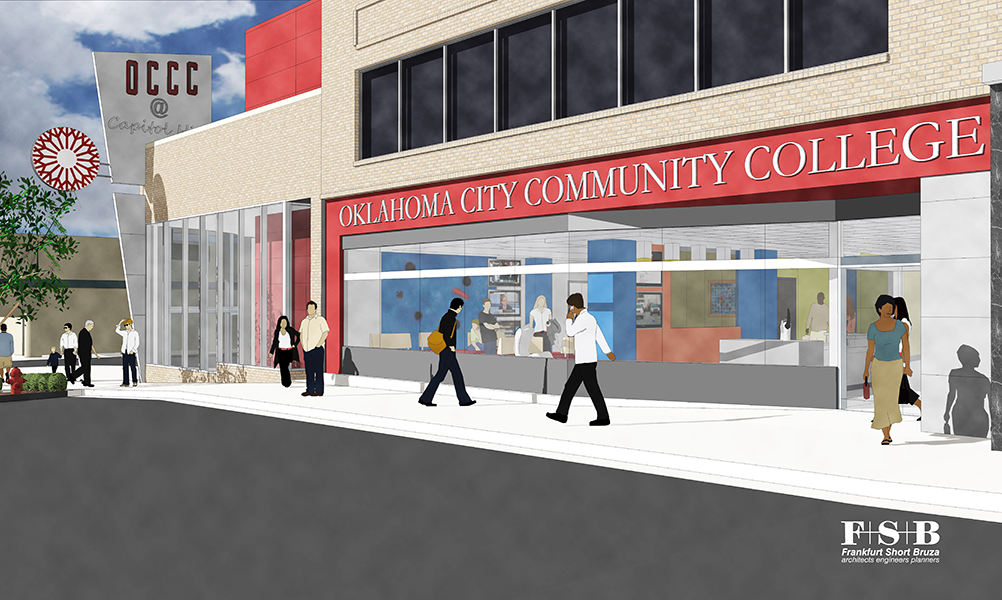More than $7 million needed for Capitol Hill Center project


Few students on campus know about the college’s off-campus branch in the Capitol Hill area just south of downtown Oklahoma City.
Those who do know may have taken advantage of the services offered there, including GED instruction and English as a Second Language classes.
But its visibility in the community could increase when the new Capitol Hill Center is ready for occupancy. A campaign to raise funds for the new Capitol Hill Center will kick off in a few short months, said Steven Bloomberg, Community Development vice president.
The campaign is expected to take about nine months and aims to raise $5 million.
OCCC has rented temporary facilities to hold classes in the Capitol Hill area since 2000, Bloomberg said.
With services in this area of Oklahoma City, he said, education can reach more people who may not have had access to it before. Bloomberg said the branch campus in this area allows more citizens in the community to take classes to prepare for jobs.
The current location is in the United Methodist Church, located at 123 SW 25th St. OCCC has been leasing the second floor of this building since February 2012. The 5,000-square-foot space houses four to five classrooms.
The facility helps build programs before they move a few blocks down to the permanent location in a couple of years, Bloomberg said. The new building will be located at 325 SW 25th St.
The site is one property but two separate buildings, Bloomberg said. The new and permanent Capitol Hill Center will be the old Langston building and the former, and famous, Katz drug store, where Civil Rights leader Clara Luper and her students staged sit-ins during the 1960s.
These two buildings will provide a total of 44,500 square feet in the new facility. Bloomberg said the strategy behind having the temporary location a few blocks from the future facility is to “incubate programs” because it is easier to build them this way.
Bloomberg said the Capitol Hill Center has three purposes.
The first is to provide adult education, such as the ability to receive GEDs, learn English as a second language, provide employment transition classes, and to give people basic skills for good paying jobs.
The second reason is to offer credit courses such as “gateway” classes or general education courses. This is to prepare students to “matriculate” to the main OCCC campus from the Capitol Hill Center.
The third reason is for business development. The Capitol Hill Center wants to help people start new businesses in the area and help people improve their business if they already own one.
Current Capitol Hill Center student, Cinthia Figueroa, has been attending this campus for almost three months. She said in high school she got lost.
“In high school I did not understand what was being taught,” she said.
But in her classes now “they explain and help more.”
Figueroa is working on earning her GED, after which she plans to attend the OCCC main campus.
Another Capitol Hill student, Diana Salas, is working toward her GED, while taking classes in English as a second language. She said this location makes it easier to take classes and learn. She hopes eventually to transition to the OCCC main campus, as well.
The whole project is expected to cost more than $7 million for construction, Bloomberg said. This does not include furnishings or electronics.
The funding for the center will not come from students, but instead will come from private funds and contributions.
The plan is to complete the center in phases.
The first phase is estimated to take 18 to 24 months after the kick-off. It will accommodate roughly 8,000 to 10,000 people in the 10,000 square feet that will be renovated.
The second and final phase will be finished approximately two years after the first phase.
The overall estimate of people this center will serve when the entire facility is finished is 10,000 to 15,000 people, Bloomberg said.
The temporary facility served 5,500 people in 2012, so this new facility will be able to reach many more people. It is a hope to keep growing existing programs with each phase of the center, Bloomberg said. He said with the growth of the metropolitan Oklahoma City area, it is definitely a possibility to have more OCCC campuses in the future.
For more information about the Capitol Hill Center, call Bloomberg at 405-682-7814 or email sbloomberg@occc.edu.